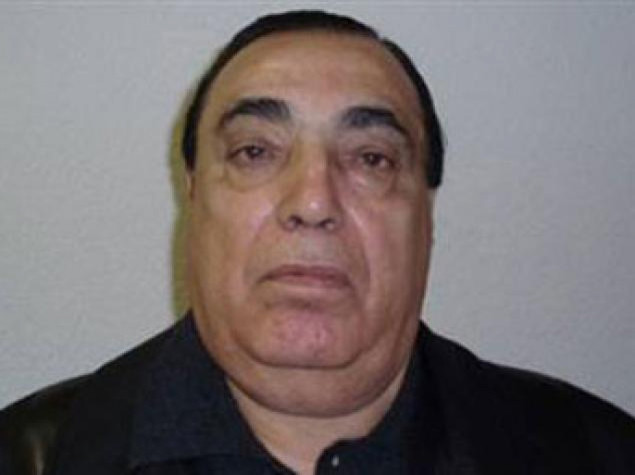Aslan Usoyan: The Yazidi Kurd Who Became The Russian Mafia Godfather

In a scene worthy of a cinematic masterpiece, one of the top Mafia bosses in Russia was assassinated by a sniper in broad daylight on a Moscow street just outside one of his favorite restaurants on Wednesday.
Russian police and detectives are now searching for the killer (or killers) who ended the life of Aslan Usoyan, the ethnic Yazidi Kurd who rose to the top of Russia’s turbulent and extremely violent world of organized crime.
The 75-year-old Usoyan, known as "Grandpa Khassan," was likely the victim of a contract killing over gangland turf, said the state-controlled Itar-Tass news agency.
Usoyan’s two bodyguards were unable to track or capture the killer, who escaped into the Moscow twilight. A female restaurant worker was also shot in the ambush, but survived.
Adding to the cinematic intrigue, Russia’s Investigative Committee, the principal investigating authority in the country akin to the FBI, told Interfax news agency the weapon used in the attack was a silencer-fitted 9-millimeter VAL assault rifle that has a range of up to 400 meters -- the type of firearm normally used by elite special forces units of the military.
Russian media reported that it is nearly impossible to detect the location of a shooter who uses the VAL rifle. These weapons can also easily pierce body armor and even 6-millimeter-thick sheets of steel.
In addition, Usoyan was killed by a single bullet, suggesting the killer was a dedicated, highly trained professional marksman.
The fact that Usoyan was murdered was hardly a surprise, though, through the very public killing recalled the gang wars that plagued Russia in the 1990s.
RIA Novosti reported that Usoyan had survived at least two prior assassination attempts -- one in 1998 (in Sochi, southern Russia), the other in 2010 (also in Moscow). A police source told Interfax that the failed 2010 attempt and the successful 2013 killing were likely planned by the same parties.
During his multi-decade career in the underworld, Usoyan was involved in all the usual Mafia activities, including gambling, drug trafficking and illegal arms, but also in some rather exotic criminal endeavors, like the illegal extraction of mineral resources.
The Independent newspaper of the UK speculated that the Usoyan killing most likely was masterminded by followers of Tariel Oniani, a Georgian gangster who is currently in jail but had long been Grandpa’s enemy and rival.
However, according to some reports, one far-fetched theory posits that Usoyan’s Kurdish ancestry may have played a role in his demise. One week after the murder of three Kurdish nationalist women in Paris, it was rumored that Usoyan was smuggling illegal weapons to Kurdish separatists in Turkey, suggesting perhaps an Ankara connection.
Of greater concern now among Russian authorities is the likelihood of a new round of gangland killings to avenge Usoyan.
Russian MP Alexander Khinshtein, a member of the State Duma's Security Committee, told media: “The killing of such an influential figure cannot go without revenge from his supporters. This is likely to bring about a new wave of attacks and murders.”
Born in Soviet Georgia in 1937, Usoyan served his first prison sentence at the age of 19 following a fight with police. By the late 1960s (while serving in prison) he had already risen to the position of “thief-in-law,” a Russian term that roughly equates to “Mafia godfather.”
Mark Galleoti, a professor at New York University who is an expert on Russian organized crime. told the Independent that Usoyan was an old-fashioned gangster, the kind that is vanishing now.
“Usoyan was very much a Don Corleone figure,” Galeotti said. “He had enough links with political structures to ensure that he had protection, but he didn’t actually work directly with politicians.”
Usoyan also belonged to one of the world’s most mysterious and obscure ethnic groups – the Yazidi Kurds. Numbering less than 1 million in total, about one half of these people currently live in northern Iraq, with sizable communities in Armenia (where many work as shepherds and where they are well integrated), Russia and Germany (where many Turkish-based Yazidis have migrated).
Unlike the majority of their Kurdish brethren, the Yazidis are not strictly speaking Muslim -- rather they practice a faith called Yazidism, which combines elements of pre-Islamic Kurdish beliefs along with those of the ancient religion of Iran, Zoroastrianism, as well as Sufi Muslim mysticism and even Christianity.
The Yazidis are monotheistic, but they also worship lesser deities including Malak Taus, the “peacock god” -- and they do not consider Lucifer a fallen angel. (Some fundamentalist Muslims castigate the Yazidis as "devil worshipers" since the other name of Malak Taus, Shaytan, is the name found for "Satan" in the Quran.)
Yazidis have been targeted for sectarian violence in the chaos of Iraq in the decade since the U.S. invasion. The worst massacre occurred in August 2007 when a series of coordinated bombings perpetrated by Sunni Muslim extremists killed hundreds of Yazidis in and around the city of Mosul in northern Iraq.
Aside from Usoyan, perhaps the best known Yazidi Kurd in the world is Feleknas Uca, a former member of the European Parliament for Germany.
© Copyright IBTimes 2024. All rights reserved.





















